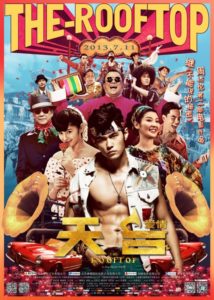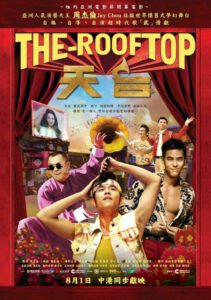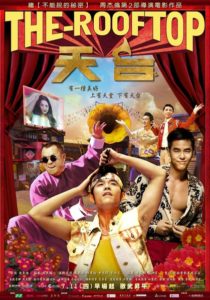The Rooftop
天台
Taiwan/China/Hong Kong, 2013, colour, 2.35:1, 117 mins.
Director: Zhou Jielun [Jay Chou].
Rating: 4/10.
A wannabe retro musical that sinks in styling overkill and half-baked ideas.
Galilee city, somewhere in Greater China, around the 1970s. Orphaned best friends Langzigao (Zhou Jielun), Hei Lun (Ke Youlun), Zeng Danhua (Song Jianzhang) and Zhang A Lang (A Lang) live in a rooftop community, in a crowded area of the city, where they’ve been raised by their de facto foster mother Moli (Xu Fan). When they’re not in the bowling alley, Langzigao, Zeng Danhua and Zhang A Lang work for a doctor, Bo (Zeng Zhiwei), who runs his herbal-medicine business with a touch of showbiz, likes flashy cars and has a stupid son, Douhua (Lin Youzhi). Hei Lun works as a “rent collector” from small businesses in the southern district for Galilee’s ruthless godfather – and major  benefactor – Lei (Wang Xueqi). Pleased with Hei Lun’s work, Lei also gives him Dragon Gate Baths as part of his collection turf, much to the jealousy of Lei’s favoured sidekick, Hong Mao (Huang Huaichen). Langzigao idolises Li Xin’ai (Lin Xin’ai), a girl in a shampoo advertisement that overlooks The Rooftop; one day, he finally bumps into her in the street while she’s filming a romantic musical drama, Twilight Bandit 黄昏大盗, with male star Xu Wei (Qiu Kaiwei). Langzigao gets a job on the film as a stunt double and finally invites her out, along with his three pals, to the night market at Lovers’ Lake. Afterwards, she goes back with them to The Rooftop, where she tells Langzigao she was forced to sign with Xu Wei’s company because of gambling debits her father (Zhong Zhentao) owes him. When Xu Wei hears she has been spending time with
benefactor – Lei (Wang Xueqi). Pleased with Hei Lun’s work, Lei also gives him Dragon Gate Baths as part of his collection turf, much to the jealousy of Lei’s favoured sidekick, Hong Mao (Huang Huaichen). Langzigao idolises Li Xin’ai (Lin Xin’ai), a girl in a shampoo advertisement that overlooks The Rooftop; one day, he finally bumps into her in the street while she’s filming a romantic musical drama, Twilight Bandit 黄昏大盗, with male star Xu Wei (Qiu Kaiwei). Langzigao gets a job on the film as a stunt double and finally invites her out, along with his three pals, to the night market at Lovers’ Lake. Afterwards, she goes back with them to The Rooftop, where she tells Langzigao she was forced to sign with Xu Wei’s company because of gambling debits her father (Zhong Zhentao) owes him. When Xu Wei hears she has been spending time with  Langzigao, he determines to wreck the relationship.
Langzigao, he determines to wreck the relationship.
REVIEW
The Rooftop 天台 is proof that a film devoid of purpose or invention will always remain so, however much money, star power and technical expertise are thrown at it. After an impressive debut as a director six years ago with college melodrama Secret 不能说的秘密 (2007), Taiwan singer-actor Zhou Jielun 周杰伦 [Jay Chou] aims much higher and falls much farther with his second film-making gig, a rare attempt at a Chinese-language musical comedy. Set like Secret in a kind of idealised, fairytale universe, it certainly has the raw material to realise its aims and the basic simplicity to work as a musical. But at every stage the movie fails to build on its promise and to show any clue how to construct a musical comedy, ending up as a grab-bag of third-hand ideas that hawls its way across two, increasingly wearisome hours.
Though a Sino-pudding in financing and casting, and set in a fictional city (“Galilee”) in what could be any time from the 1950s to 1980s but averages out around the 1970s, the film actually has a strong local flavour. Like “Harbour City” in Black & White Episode I: The Dawn of Assault 痞子英雄首部曲 全面开战 (2012), there’s no mistaking this is really Taiwan by any other name – from the small-town feel, the parochial attitudes and humour, to the calligraphy, scooters and US influences.
There’s nothing endemically wrong with that. But in what is basically a Taiwan period youth movie, it makes the three elder guest stars – China’s Wang Xueqi 王学圻 and Xu Fan 徐帆, with their northern Mandarin and gravitas, and Hong Kong’s Zeng Zhiwei 曾志伟 [Eric Tsang], with his southern Mandarin and antics – look even more out of place, as if they’ve wandered into the wrong movie by mistake. In a low-key part, Hong Kong’s Zhong Zhentao 钟镇涛 [Kenny Bee], now settled down into father roles, doesn’t stick out so much. Nor, unfortunately for the film, does the only other non-Taiwan lead, 22-year-old, Xi’an-born Lin Xin’ai 李心艾 – who has interesting looks (she’s quarter-Russian), no prior acting experience, and a cute-squeaky voice that only underlines the one-dimensional nature of her girlfriend role.
The essentially modest Secret went for a glossy, South Korean look, doused the soundtrack in orchestral and piano music, and had two actresses (Gui Lunmei 桂纶镁, Zeng Kaixuan 曾恺玹) who brought some personality to their sterotypical roles. However, with Rooftop Zhou is much more ambitious – tipping his hat to a string of western musicals from Saturday Night Fever (1977) to Grease (1978); composing over a dozen musical numbers that range from Central Euro klezmer, through calypso, waltz and The Bee Gees, to ensemble dances; and unleashing an orgy of production and costume design on a level with Baz Luhrmann’s Moulin Rouge! (2001). Ace Taiwan d.p. Li Pingbin 李屏宾 [Mark Lee] is again on hand, as is Hong Kong stylist Wu Lilu 吴里璐 [Dora Ng], and they’re joined this time by Japan’s Akatsuka Yoshihito 赤塚佳仁, art director on Warriors of the Rainbow 赛德克•巴莱 (2011) and set decorator on Kill Bill: Vol. 1 (2003), to complete the hyper-retro look.
The result is a Luhrmann-like monster mash of visual and musical borrowings, a Never Never Land with no guiding aesthetic of its own. The overstatement might have worked if hooked to a well-constructed screenplay with memorable dialogue. But this time Zhou alone is credited with the script as well as the story, and the result is shallow beyond belief. After coming up with the idea of a hippy-trippy rooftop community, and introducing it in an initially impressive swirl of characters and relationship hints, he makes no attempt to integrate it later into the plot, or give the community’s dynamics or relationships any depth. So many other ideas in the movie follow a similar path, from Zeng’s showbizzy herbal medicine shop (which exists just to provide musical numbers) to Wang’s evil gangster (who exists merely to provide contrast at occasional moments).
This lack of follow-through is most noticeable in the musical numbers. Most seem to last no more than a minute or so – like an opening chorus shorn of any development. A couple of numbers – including the opening one, with wheelchair patients and sexy nurses in the medicine shop – promise more than they finally provide; other numbers pop up for no dramatic reason and just as rapidly disappear. Choreography is minimal, with ensemble rooftop numbers (rather awkwardly led by the veteran Xu) making no attempt to explore the large, lavishly constructed set. The most disappointing numbers are a ballad by Zhou, that begins with passers-by sliding into dance moves, and a bowling-alley number featuring the staff in the lanes: both abruptly throw their initial ideas away without elaborating them into proper musical sequences.
Rooftop is full of wasted opportunities like this, and ideas borrowed from better movies. Stripped of its production design and costumes, it has very little under the surface, apart from gobs of metrosexual posing by Zhou and his pals (the film’s first half-hour has an especially gay vibe, seemingly aimed at Zhou’s young female fans) and attitudinising rather than real performances. The dialogue appears to have been made up on the spot, and the movie’s second half, with virtually no plot or character development, and a main character who isn’t even driving events most of the time, is a long hawl across the finishing line.
Zhou, who’s never come across a line of dialogue he can’t mumble his way through, sounds par for the course here, as well as looking faintly ridiculous in a series of colorful bandanas and an assisted hair quiff. (The nickname for his Fonz lookalike, Langzigao 浪子膏, literally means “Slacker Gel”.) To be fair, he’s not alone in the retro-styling overkill: Rooftop seems to think that overstatement (in design, camerawork, visual effects) is entertaining enough on its own terms. With Zhou very low-key, it’s local rocker Ke Youlun 柯有伦 (Din Tao: Leader of the Parade 阵头, 2012) who provides the only memorable performance among the four young leads. Trainspotters will note Hong Kong director Liu Weiqiang 刘伟强 [Andrew Lau] in a bowler-hatted cameo as the town mayor and onetime Shaw Brothers’ action star Jiang Dawei 姜大卫 [David Chiang, aka John Chiang] in a wheelchair near the end.
In the Mainland the film’s Chinese title was expanded to 天台爱情 (“Rooftop Love”).
CREDITS
Presented by Evergrande Pictures (CN), Talent Films (CN), Chuang Ying Pictures Entertainment (TW), Edko Films (HK). Produced by Chuang Ying Pictures Entertainment (TW).
Script: Zhou Jielun [Jay Chou]. Photography: Li Pingbin [Mark Lee]. Editing: Li Dongquan [Wenders Li]. Music: Huang Yuxun. Songs: Zhou Jielun [Jay Chou]. Choreography: Zhao Weihong, Huang Xinyu. Production design: Akatsuka Yoshihito. Art direction: Asano Makoto, Li Miao. Costume design: Wu Lilu [Dora Ng]. Sound: Du Duzhi. Action: Yang Gil-yeong, Xu Chengyi. Visual effects: Hu Shengzhong, Zhang Jiahua.
Cast: Jay Chou (Langzigao/Wax), Lin Xin’ai (Li Xin’ai/Starling), Zeng Zhiwei [Eric Tsang] (Bo, doctor), Wang Xueqi (Big Brother Lei/Rango), Ke Youlun (Hei Lun/Black Wheels/Tempura), Xu Fan (Moli/Jasmine), Song Jianzhang (Zeng Danhua/Egg), A Lang [Huang Junlang] (Zhang A Lang), Huang Huaichen (Hong Mao/Red Hair/Big Red), Qiu Kaiwei (Xu Wei/William), Zhong Zhentao [Kenny Bee] (Li, Xin’ai’s father), Liu Weiqiang [Andrew Lau] (Galilee mayor), Jiang Dawei [David Chiang] (old Langzigao), Fu Yiwei (old Xin’ai), Lin Weiheng (bowling-alley boss), Lin Youzhi (Douhua/Beancurd, Bo’s son), Tang Congshen (night-market stall-owner), Zhu Degang (Bao), Su Da (film director), Liu Genghong (Li, master), Zhang Jie (sound recordist), Wu Junxian (Solomon), Chen Yuxuan (Donghai), Yu Guanhua (Jiangyou/Soy Sauce), Cai Chaohua (rooftop inhabitant, Moli’s secret lover), Chen Hongjing (Qiaokeli/Chocolate, Digua’s secret lover), Zheng Haotian (Digua/Sweet Potato, Hei Lun’s secret lover).
Release: Taiwan, 11 Jul 2013; China, 11 Jul 2013; Hong Kong, 1 Aug 2013.
(Review originally published on Film Business Asia, 31 Jul 2013.)
